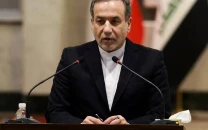Thousands protest in Spain's Valencia over poor flood disaster response
Demonstrators voice anger over slow emergency response, failure to issue timely warnings as authorities disperse crowd
1731224015-0/BeFunk_§_]-(64)1731224015-0-640x480.webp)
Thousands of protesters gathered in Valencia, Spain, on Saturday to demand accountability for the government's handling of the region’s deadly floods, which have claimed at least 220 lives and left nearly 80 people missing.
Demonstrators, including civil groups and unions, voiced their anger over the slow emergency response and the failure to issue timely warnings, leading to widespread devastation.
The protest turned tense as some demonstrators clashed with riot police outside the city’s government building, with authorities using batons to disperse the crowd.
The catastrophic floods, caused by a severe Mediterranean storm that struck eastern Spain last week, have been described as one of Europe’s deadliest natural disasters in decades.
The waters inundated large parts of the Valencia region, destroying homes, infrastructure, and businesses.
The region's response has been sharply criticized, particularly the delayed flood alerts.
While Spain’s national weather agency issued a red alert, the regional government, led by Carlos Mazon of the conservative Popular Party, did not send out warnings until hours later, when floodwaters had already begun filling homes.
Protesters were particularly outraged by the slow mobilization of resources. In some of the hardest-hit areas, volunteers were the first responders, while official emergency services took days to deploy large numbers of police and military personnel. In Valencia’s city center, protesters displayed banners reading “You killed us!” and called for Mazon’s resignation.
Some demonstrators left muddy boots outside the council building to symbolize their fury over the authorities' lack of preparedness and perceived negligence.
"We want to show our anger over the poor management of this disaster that has affected so many people," said Anna Oliver, president of one of the protest groups, Accio Cultural del Pais Valenciano.
Earlier this week, similar protests erupted when King Felipe and Prime Minister Pedro Sánchez visited the flood-stricken areas, with some demonstrators hurling mud and shouting “murderers.”
The devastating floods have left a lasting impact on the region, with many survivors still struggling to access basic services, such as water and electricity. Some areas remain completely cut off, and rescue operations continue around the clock.
In addition to the human toll, the floods caused widespread destruction of infrastructure, leaving local authorities to scramble to restore services.
Emergency crews, including almost 15,000 military and police personnel, have been working relentlessly to clear debris and search for missing persons.
In response to the crisis, the Spanish government has announced a €10.6 billion ($11.5 billion) aid package to support recovery efforts in the affected regions.
The measures include tax relief, mortgage deferments, and financial assistance for small businesses and households that have suffered losses.
Prime Minister Sánchez also requested assistance from the EU’s Solidarity Fund to help cover the costs of rebuilding and recovery.
Despite these efforts, the delays in flood warnings and the initial lack of a coordinated response have left many feeling abandoned by the authorities.
Local leaders, such as Maribel Albalat, the mayor of the town of Paiporta, have expressed frustration over the ongoing difficulties in recovering from the disaster.
As Spain continues its recovery, the protests in Valencia highlight deep dissatisfaction with the handling of the crisis and the need for greater accountability from the government.


















COMMENTS
Comments are moderated and generally will be posted if they are on-topic and not abusive.
For more information, please see our Comments FAQ